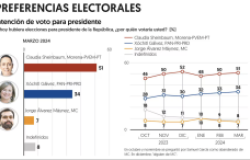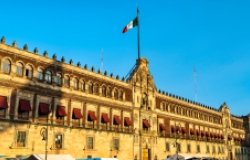Next Generation of Leaders Work to Solve Global Challenges
As the United States takes another step this week toward determining who will be on the ballot in November, the nation's brightest emerging leaders will be meeting at the Woodrow Wilson Center to develop innovative solutions to pressing global challenges the next president will face.
CONTACT: Jill Angelo, 512-471-8936
As the United States takes another step this week toward determining who will be on the ballot in November, the nation's brightest emerging leaders will be meeting in Washington, D.C., to develop innovative solutions to pressing global challenges the next president will face.
The American Assembly will convene "The Next Generation Project: U.S. Global Policy and the Future of International Institutions," this Thursday through Saturday (June 5–7) at the Woodrow Wilson International Center for Scholars, with 70 young leaders from around the country in business, government, law, technology, religion, the military, agriculture, international institutions, academia, and the media.
The Next Generation Project is The American Assembly's nonpartisan initiative to bring together emerging talent, ranging from age 30 to 45, to discuss the global challenges of the 21st century. Almost two years of meetings, held across the country, have set the stage for this National Assembly in Washington. The Project's findings and recommendations will be presented to the presidential candidates and their advisers.
"There is no greater responsibility than preparing the next generation of American and world leaders, and it is one the Next Generation Project has fully embraced," Lee Hamilton, President and Director of the Woodrow Wilson International Center for Scholars, who serves as chair and host of the meeting, said. "I am excited to see so many talented young leaders seriously thinking about future challenges, and the Woodrow Wilson International Center for Scholars is thrilled to partner with the Project. We share its internationalist and forward-looking outlook in hopes of securing a more peaceful and prosperous future for all the world."
Central to the project has been identifying Next Generation Fellows – representing a spectrum of views, interests and backgrounds – and bringing them together to discuss global issues. Fellows assess whether the current national security, multilateral and international institutions are sufficient to meet future challenges and explore innovative responses to an era of rapid globalization.
"This is a new world we are living in, and we need innovative approaches to meet the complex challenges the U.S. and the world face," said Francis J. Gavin, the director of the Project and the Director of Studies at the Robert S. Strauss Center for International Security and Law. "This Assembly will build upon the creative thinking and solutions produced by the diverse talent from around the country. It is our hope that these fresh perspectives will drive the political debates about the future of America's role in the world."
Speakers at the Assembly will include:
• Richard W. Fisher, President and CEO, Federal Reserve Bank of Dallas;
• Diana Farrell, Director, McKinsey Global Institute;
• Dr. Donald M. Kerr, Principal Deputy Director of National Intelligence;
• Jane Holl Lute, Assistant Secretary General, Department of Peacekeeping Operations, United Nations;
• LTC John A. Nagl, U.S. Army, author "Learning to Eat Soup with a Knife: Counterinsurgency Lessons from Malaya and Vietnam;" and
• Sonal Shah, Google Development, Google.org.
The Project was created under Mr. Fisher's leadership as Chairman of the American Assembly from 2002-05.
"This effort was designed to both identify emerging leaders across the country, with special emphasis in areas of emerging economic, political and intellectual power, and tap into their vision of a policy framework for America's future. The project aims to build new policy networks, generate creative ideas and help shape discussion of the issues," Mr. Fisher said.
The project is led by a distinguished senior advisory council, chaired by LBJ Centennial Chair in National Policy and Assembly trustee Admiral Bob Inman. Andrew P.N. Erdmann of McKinsey and Company chairs the steering committee.
"In the grand tradition of The American Assembly, The Next Generation Project has reached broadly across the country to identify talented young women and men," Inman said. "I expect the Washington meeting to add frosting to the cake. I believe the project will have a long-lasting impact on how the country thinks about its largest challenges."
David H. Mortimer, president of The American Assembly, said, "The Next Generation Project has been a unique and ambitious undertaking bringing together our nation's young, talented leaders and engaging them in the consideration of U.S. global issues at this critical period in our history. The project has been cause for considerable national optimism, and we look forward to the National Assembly and intend to assure that the impact of this initiative is ongoing and long-lasting."
The Assembly underwrote the initiative with assistance from The Ford Foundation, Carnegie Corporation of New York and others.
The full list of Fellows, the reports from the four previous Next Generation Project meetings, held in Dallas, San Diego, Denver and Chicago, and additional information about the initiative can be found on the Project's dedicated web site, www.nextgenerationproject.org.
The American Assembly is affiliated with Columbia University. President Dwight D. Eisenhower founded the Assembly in 1950 as one of this country's first nonpartisan, national public affairs forums.
Mr. Mortimer (212-870-3500) and Professor Gavin (512-471-5249) are available for interviews or any inquiries.
###










